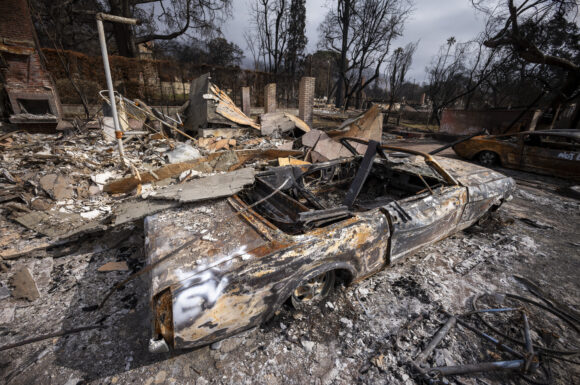Interested in Claims?
Get automatic alerts for this topic.
July 29, 2025 | by ltcinsuranceshopper


Natural disasters across the globe cost insurers US$80 billion during the first half of 2025, up from US$64 billion in H1 2024, according to Munich Re’s mid-year natural disaster report.
On the other hand, overall economic losses (which include insured claims) dropped slightly to US$131 billion during H1 2025, compared with $155 billion last year (adjusted for inflation). Nevertheless, economic losses were well above long-term average, Munich Re said.
The U.S., once again, drove natural disaster losses – particularly due to record-breaking wildfires around Los Angeles in January, said the report titled “Wildfires around Los Angeles, severe thunderstorms: US natural catastrophes dominate global losses in the first half of 2025.”
Read more: First-Half 2025 Insured Losses From Natural Cats Hit $100B, Driven by US Events
Both overall losses and insured losses were significantly higher than the average for both the previous 10 years and the previous 30 years. (Adjusted for inflation, average overall losses for the previous 10 years were US$101 billion, while average losses for the previous 30 years were $79 billion. Average insured losses were $41 billion and $26 billion for the previous 10 years and 30 years, respectively.)
Munich Re said insured losses in H1 2025 were the second highest in the first half of any year since it began keeping records in 1980 – only surpassed by the first half of 2011 when insured losses even higher, driven by a severe earthquake and destructive tsunami in Japan.
“Weather disasters caused 88% of overall losses and 98% of insured losses, while earthquakes accounted for 12% and 2%, respectively,” the report said.
Los Angeles Wildfires
The wildfires in the greater Los Angeles area resulted in the costliest natural disaster during the first six months of 2025 with an overall loss of an estimated $53 billion, around $40 billion of which was insured, Munich Re said. The fires claimed the lives of 29 people.
“Never before had wildfires caused such extensive damage. The overall losses and insured losses due to this single event were nearly twice as high as global wildfire losses in 2018, which had previously been the most expensive wildfire year,” the report said.
Notably, the wildfires occur in winter, which is typically rainy, Munich Re added.
“The overall losses and insured losses due to this single event were nearly twice as high as global wildfire losses in 2018, which had previously been the most expensive wildfire year.”
Climate Change
While studies indicate that climate change is increasing the risk of wildfires by elevating the frequency of conditions that cause them, Munich Re acknowledged that the circumstances exacerbating the LA fires is complex.
For example, the rainy season in Southern California usually begins around October, but in 2024, there was very little rain, the report said.
“In previous years, an abundance of precipitation had conversely allowed vegetation to flourish. After a long dry phase in late 2024 and early 2025, an excess of highly flammable brush fueled the wildfires,” it added.
“Climate change is a fact and is changing life on earth. Disasters like the one in Los Angeles have become more likely due to global warming and they teach us a very important lesson: people, authorities and companies must all adapt to new circumstances,” commented Thomas Blunck, member of Munich Re’s Board of Management.
“The best way to avoid losses is to implement effective preventive measures, such as more robust construction for buildings and infrastructure to better withstand natural disasters,” he continued. “Such precautions can help to maintain reasonable insurance premiums, even in high-risk areas. And most importantly: to reduce future exposure, new building development should not be allowed in high-risk areas.”
Other regional findings from the report included:
Photograph: Structures damaged by the Eaton Fire in Altadena, California, on February 4, 2025. (Ringo Chiu via AP)
Topics
Natural Disasters
USA
Claims
Get automatic alerts for this topic.
View all